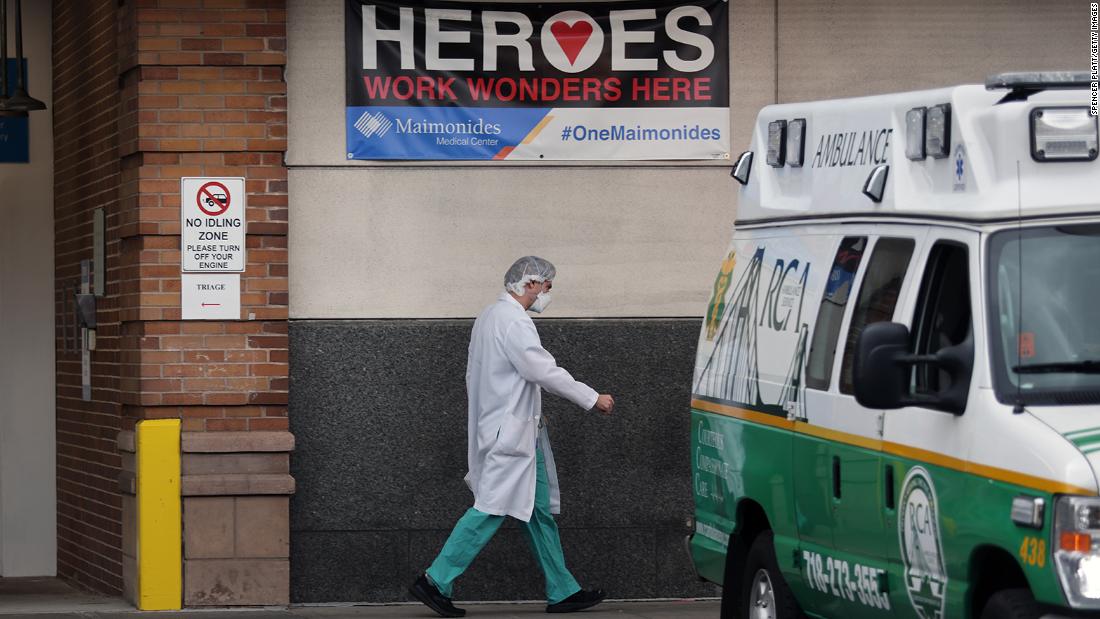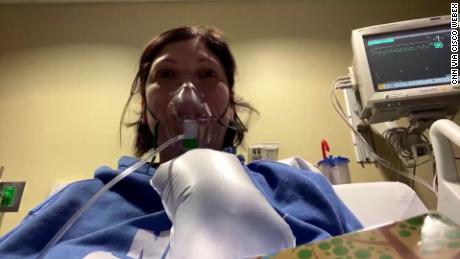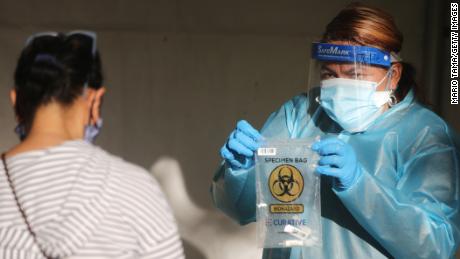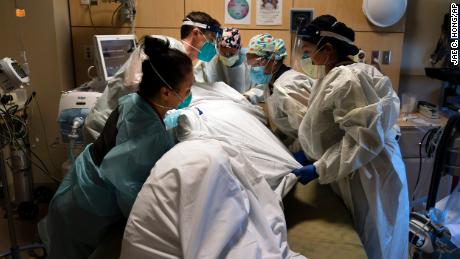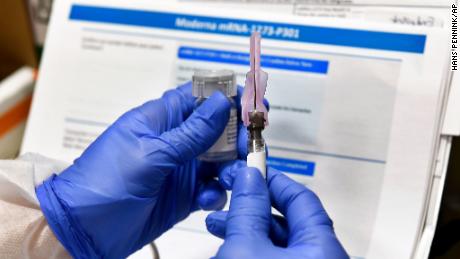Doctor warns the US is likely heading toward a grim reality in terms of overwhelmed hospitals and Covid death count
What comes next is likely the country’s “worst-case scenario in terms of overwhelmed hospitals, in terms of the death count,” said emergency medicine physician Dr. Leana Wen.
“There’s just so much virus in our communities right now,” she said.
It’s a grim reality reflected in the latest numbers.
- The US had its highest day of new cases — 217,664 — and deaths — 2,879 — on Thursday, according to Johns Hopkins University.
- There were a record-setting, 100,667 hospitalizations, according to the COVID Tracking Project.
- The US has been adding 1 million new cases every six days for three weeks.
- Covid-19 was the leading cause of death this week, with 11,820, an average of 1,660 a day, according to the University of Washington’s Institute for Health Metrics and Evaluation (IHME).
More than 14 million cases and 276,000 deaths have been recorded in the US, Johns Hopkins says.
So far for Friday, Johns Hopkins reported there have been 51,094 cases and 655 deaths.
IHME projects 262,000 more people will die over the next four months and daily deaths will peak at more than 2,900 in mid-January.
“Scaling up mask use to 95% can save 66,000 lives by April 1,” the team said.
Health care systems under stress
Leading health officials say rising cases will be followed by more hospitalizations that could cripple health care systems across the country. Hospitals and experts all over the US are sounding the alarm.
Marvin O’Quinn, president and chief operating officer of CommonSpirit Health, which runs hospitals in 21 states, told CNN that all its hospitals are getting more patients.
“We are now up to roughly 2,100 positive cases in our hospitals. That’s an increase of almost 70% since November 11,” O’Quinn said. “We’re seeing about 70 to 100 new cases every day.”
In Pennsylvania, just under 5,000 people are hospitalized with Covid-19, and two parts of the state are inching closer to staffing shortages, Secretary of Health Dr. Rachel Levine said Thursday.
“It is so important to remember that all of us have to be mindful, that we all have a role to play in what is happening in the hospitals right now,” Levine said. “You might not need hospital care right now; you might not have a loved one in the hospital right now. But what is happening in our hospitals has a direct impact on you.”
In the past two two months, the positivity rate in Miami-Dade County, Florida, has spiked 91%, the county’s Chief Medical Officer Peter Paige said Friday. Hospitalizations spiked 139%.
Maryland health officials reported 3,792 new Covid-19 cases Friday, breaking the state’s previous record for daily cases, said the Department of Health.
This is the first time Maryland has passed 3,000 cases in a day, CNN’s tally shows.
Growing acceptance of masks, vaccine
Most US adults — 72% — say it bothers them when people in public do not wear masks, according to a survey from the Pew Research Center. Far fewer adults — 28% — say it bothers them at least somewhat when stores require customers to wear masks for service.
Results showed 87% say they have worn a mask or face covering “all or most of the time” in stores and businesses over the past month. That includes 91% of Democrats and 81% of Republicans.
Pew also reported that 60% of respondents now say that if a Covid-19 vaccine were available today, they would take it.
Among those not willing to get the vaccine, about half of them — or 18% of US adults — say it’s possible they could decide to get vaccinated once more information becomes available, but 21% of US adults are “pretty certain” more information will not change their mind.
The survey was conducted between November 18 and 29 and included 12,648 respondents.
The Department of Health and Human Services launched its national ad campaign promoting awareness about forthcoming vaccines with a modest $150,000 ad buy on Youtube.
Fauci: ‘Full brunt’ of Thanksgiving not yet felt
“The people who make our health care system work are relying on you to do the right thing,” she continued.
And hospitals nationwide have yet to see the impacts that Thanksgiving gatherings and travel could bring, with another surge projected in coming weeks.
On NBC’s “Today” on Friday, Dr. Anthony Fauci said the “full brunt” of Thanksgiving coronavirus cases won’t be clear for another week or two.
“We’ll see more of the surge as we get two to three weeks past (and) it butts right up on the Christmas holiday, as people start to travel and shop and congregate,” Fauci said.
Fauci, director of the National Institute of Allergy and Infectious Diseases, said he accepted President-elect Joe Biden’s offer to serve as his chief medical adviser “right on the spot.”
Fauci said he supports as a “good idea” Biden’s plan to suggest all Americans wear a mask for the first 100 days of his presidency.
Dr. Celine Gounder, a member of the Biden-Harris transition Covid-19 advisory board, said the incoming administration doesn’t plan a national shutdown.
“Shutdowns, or lockdowns, are really not on the table, at least not from the Biden-Harris team. We really view this as restrictions that you dial up or dial down based on the local epidemiology,” Gounder said.
New strict measures
Governors expect first vaccine doses to arrive soon
Meanwhile, local and state leaders have begun giving updates on when they expect their first batches of vaccines. No vaccine has received emergency use authorization from the Food and Drug Administration.
New York City Mayor Bill de Blasio said Thursday he expects the first round in about 12 days from Pfizer. About a week later, the city will get vaccines from Moderna.
The priority for distribution will be high-risk health care workers and residents, and workers in nursing homes, he said.
“Over time, there will be enough vaccines for everyone,” de Blasio said.
Massachusetts Gov. Charlie Baker said he expects about 300,000 doses of a Covid-19 vaccine by the end of the month. Health care workers and long-term care facility residents and staff are “absolutely going to be up near the top of the list” for the first doses, Baker said.
CNN’s Melissa Alonso, Jacqueline Howard, Amanda Watts, Amanda Sealy, Andrea Diaz, Ganesh Setty and Jon Passantino contributed to this report.
![]()


